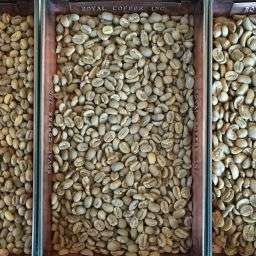
Ethiopian coffee holds a revered place in the global coffee market, celebrated for its exceptional quality and unique flavors. Originating from the birthplace of coffee, Ethiopia’s beans are not just agricultural products but are steeped in rich traditions and history.
The legend of Kaldi, the goat herder who discovered coffee’s energizing effects, underscores Ethiopia’s deep-seated coffee culture. Today, Ethiopian coffee is a staple in the world’s coffee repertoire, offering a diverse range of flavors that cater to a broad spectrum of palates.
The Unique Qualities of Ethiopian Coffee
Arabica vs. Robusta: Ethiopia’s Arabica Dominance
Ethiopia is synonymous with Arabica coffee, known for its superior quality and complex flavor profiles compared to the more robust and bitter Robusta variety. Ethiopian Arabica beans are celebrated for their diversity, with each region producing beans with distinct characteristics.
The Role of Terroir in Flavor
The terroir, or the natural environment in which Ethiopian coffee is grown, plays a pivotal role in shaping the beans’ flavor profiles. The combination of high altitude, fertile soil, and suitable climate conditions in Ethiopia contributes to the distinctive taste of its coffee, marked by bright acidity, floral notes, and a hint of fruitiness.
Key Ethiopian Coffee Regions and Their Coffees
Yirgacheffe: Floral and Citrus Notes
Yirgacheffe coffee is renowned for its light-bodied and flavor-rich profile, featuring vibrant floral and citrus notes. This region produces coffee that is often considered the pinnacle of Ethiopian Arabica.
Sidamo: Fruity and Floral Range
Sidamo coffees offer a wide range of flavors, from sweet and light with citrus notes to more intense and full-bodied with berry undertones. The diversity within the Sidamo region caters to various taste preferences.
Harrar: Bold Berry and Wine-like Acidity
Harrar is known for its strong, wine-like coffee characterized by bold berry flavors and a distinctive acidity. The dry-processing method common in Harrar enhances its unique flavor profile.
Limu: Balanced, with Citrus and Floral Notes
Coffee from the Limu region is well-balanced, featuring a medium body with noticeable citrus and floral notes. Limu coffees are often washed, which contributes to their clean and bright taste.
The Coffee Production Process in Ethiopia
Traditional Processing Methods: Washed vs. Natural
Ethiopian coffee is processed either by the washed method, which tends to produce cleaner and more acidic flavors, or by the natural (dry) method, which enhances the coffee’s sweetness and body. Each method influences the final taste profile significantly.
Impact on Flavor Profiles: Cleanliness vs. Fruity Sweetness
The choice between washed and natural processing affects the coffee’s flavor complexity. Washed coffees are praised for their clarity and vibrant taste, while naturally processed beans offer a fuller body with pronounced fruity sweetness.
Selecting the Best Ethiopian Coffee Beans
Criteria for Selection
Selecting the best Ethiopian coffee involves considering factors like freshness, roast type, and certifications such as organic and fair-trade. Freshness ensures the coffee’s inherent flavors are preserved, while the roast type can accentuate different aspects of its taste profile.
Popular Brands and Their Offerings
Several brands have garnered acclaim for their Ethiopian coffees, each bringing something unique to the table. Brands like Volcanica, Klatch Coffee, and Out of the Grey offer a range of Ethiopian coffees that highlight the country’s diverse coffee regions and processing methods, ensuring there’s a perfect match for every coffee enthusiast’s palate.
Tips for Brewing the Perfect Cup
When it comes to brewing Ethiopian coffee, the method you choose can significantly affect the flavor profile of the final cup. Pour-over methods, such as the V60, are highly recommended for Ethiopian coffees due to their ability to highlight the intricate flavors, particularly the floral and citrus notes characteristic of beans from regions like Yirgacheffe. French press brewing, on the other hand, can enhance the body and richness, making it a great choice for coffees with bold berry flavors, like those from Harrar.
Grinding the beans to the right consistency is crucial; a medium-fine grind is ideal for pour-over, while a coarser grind suits the French press. Water temperature should be between 195°F to 205°F to extract the coffee’s flavors optimally. The ratio of coffee to water is another vital consideration, with a general recommendation of 1:16 for a balanced extraction.
FAQs
What is the best roast for Ethiopian coffee? Light to medium roasts are best for Ethiopian coffee to preserve its unique flavor notes, such as floral, fruity, and citrus tones.
How should I store Ethiopian coffee beans for freshness? Keep the beans in an airtight container away from direct sunlight and heat. Storing them in a cool, dark place is preferable to maintain freshness.
What is the significance of single-origin labels on Ethiopian coffee? Single-origin labels indicate that the coffee comes from a specific region or even a single farm in Ethiopia, ensuring traceability and a distinct flavor profile that reflects the unique terroir of that area.
Conclusion
Ethiopian coffee occupies a unique position in the coffee world, offering an unparalleled range of flavors that are deeply influenced by the country’s rich coffee culture and diverse climates. From the floral and citrus notes of Yirgacheffe to the bold, wine-like acidity of Harrar, each region offers something distinct.
The meticulous process from harvesting to processing, combined with traditional and modern brewing methods, brings out the best in Ethiopian beans, offering a cup that’s not just about caffeine but a profound sensory experience.
The cultural significance of Ethiopian coffee extends beyond its taste. It’s a symbol of Ethiopian heritage, a staple of social gatherings, and a testament to the country’s pivotal role in the global coffee market. As consumers, exploring the diverse offerings of Ethiopian coffee is not just an opportunity to expand our palate but to engage with a rich tradition that dates back centuries.
In embracing the variety of Ethiopian coffees, from single-origin beans to artisan blends, coffee lovers are encouraged to experiment with different brewing methods and to appreciate the subtle nuances that each cup brings.
Whether you’re a seasoned aficionado or new to the world of specialty coffee, Ethiopian coffee offers a journey through the birthplace of coffee, inviting you to explore its rich diversity of flavors and to celebrate the art and tradition that make it truly exceptional.









